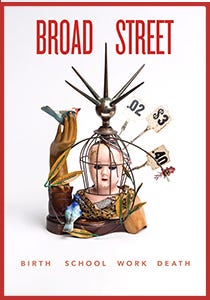Working the streets.
“When his mouth stills, Prophet fixes Boy with a glare …”

This city is full of fights.
* * *
There is the man across the sidewalk from the East 86th Street Cinemas.
He sells cheap wallets and phone cases and handbags. Early fifties, paunchy, shirt untucked. His beard is fitful. It’s had more than enough time to come in, and it’s done its best, and still it disappoints.
His merchandise is laid across a folding table at the sidewalk’s edge. There is more space between the items than any businessman would prefer. Parked in the street alongside the table is a peeling van with its side cargo door open. Inside the van are black garbage bags, lolling and flappy; inside the bags are white boxes. Sick grudging tongues and pills unswallowed.
There is the woman in her crisp forties standing across the sidewalk, her back to the Cinemas. Not shabbily dressed. She has set her body square to the accessorymonger as if to make clear she will not let this go, she will not let him go, also sends looks like darts on the chance he has missed her meaning. But she breaks off eye contact after each look. (Which can mean fear. Which can also mean its haughty opposite. You can’t tell yet. Keep watching.) Woman speaks into her phone, using a voice that tries for steadiness but can’t help climbing into indignation.
“Yeah, he’s right here,” she says.
“I’m looking at him right now,” she says.
“I’m going to call the police.”
“Eighty-Sixth Street, east of Third. On the south side.”
“He’s just standing there. Like it’s nothing.”
Man does not look at Woman. He does not turn in her direction. Instead he bustles around his table — across the front, around the sides, toward his van, back away from his van — and he puts a finger to the training beard and then withdraws it before it’s had a chance at a meaningful stroke, whether because his exercised state prevents it or because he has resolved not to trespass upon that endangered flora, and since everybody knows that anybody who paces in public must also be heard to mutter, he mutters passionately, leaving as much space between the sentences as between his display pieces of nominal leather, of notional beard.
“I don’t need that shit,” he says. “Fuck that.”
“Who you think I am?” he says. “Fuck, who you think you are?”
Everybody knows the longer the silence between mutters, the more deeply felt the sentiment.
“That bullshit. Fuck it, I don’t need it. Fuck that.”
Fuck it, you have to be somewhere, you keep walking.
* * *
This city starts fights. Unfair ones.
Unfair: lopsided, pitiably so, for reasons having nothing to do with their conduct.
Unfair: regrettable, entirely so, the two sides so wildly different that the notion they might fight — let alone that one might win — seems extravagant, spurious. What could they possibly have in common? What could they possibly have at stake?
* * *
There is the man outside the Papaya King on Third Avenue. His terms are simple:
“Dollar for coffee. Anybody got a dollar for a cup of coffee?”
But his pitch is far from it:
“It’s my birthday today. Today is my birthday.”
“Ain’t anybody got a heart? None of these people got a heart.”
“It’s my birthday today. Nobody care it’s my birthday.”
He speaks in pairs of sentences, each sentence saying nearly the same thing as the other. It is scriptural verse. He is a prophet. He spends slightly more sentences talking about the state of people’s hearts than about his price for laying off the condemnation.
There is the boy on the corner, leaning against something with two of his friends. They wear white shirts, gray slacks, blue blazers. From a nearby private school. They look fourteen, which — given the exceptional nourishment that comes with privilege — means they’re likely twelve. He calls out to the man.
“It was your birthday yesterday, too.”
And: “How many birthdays have you had this week?”
You can tell from Boy’s ramshackle grin, and from the fact he doesn’t dare look straight at the man when he says these things, and from his careful positioning behind the head of his taller friend, that this child has no idea what he’s talking about, that he has never before witnessed this man claim it was his birthday, that it very well may be this man’s birthday, that while this man likely asks for money every day it is perfectly possible — indeed likely, given how vivid his claim, given how distinctive and therefore memorable and accordingly worthless for repeat use his claim — that he was in fact born on exactly this day thirty-odd years ago to a proud and glorying mother.
When Prophet’s mouth moves, fumigating the passing crowd with guilt, he ignores Boy altogether. When his mouth stills, Prophet fixes Boy with a glare — eyes at an angle, head and darkening sockets straight ahead. It is a glare for apostates, a registering of maximum disdain, a suggestion of greater ability than willingness to destroy. Boy keeps on. Prophet keeps on.
You keep on, too. You are going somewhere, you cannot know what happens next.
* * *
There is your friend Jodi, who has it figured out. Her premises are as follows:
You cannot give to all who ask. You should not give to none at all. The disabled are deserving but unverifiable. A man, all else equal, can offer manual labor. A woman, all else equal, will be pushed to offer something else.
Her solution is a rule: Give to every woman who asks.
It is simple, reasoned, noble. You adopt the rule yourself. You resolve to give accordingly.
Except the very next day, when you pass a woman begging whom you recognize from before you adopted the rule, a woman who for months has begged regularly, sometimes daily, on the sidewalks that lead to and from your office. If you give her something today you’ll have to give her something every day. You are a wage worker, not a micro-bank.
Except a week after, because the woman begging near Grand Central is twenty rivers of commuters away from you and — this is an engineering problem, not a defect of the heart — with which do you retrieve a wallet when your left hand grasps a gym bag and your right hand a laptop case?
Except a third time, and you don’t remember the exact woman or the exact location, nor do you remember your reasons for not taking out your wallet, but the latter failure of recollection is enough to persuade you the reasons were shoddy.
One month after adoption and you have succeeded just once. You gave one woman a ten-dollar bill. The 1–3 win-loss record is dispiriting. So is the possibility you gave her the ten not out of generosity but to ease the dispiritment.
* * *
This city is a fight.
Right? This is what New York is, finally, isn’t it? An unfair fight? Every soul in the city against the city itself. Gray above, gray below, and between these the press of humanity struggling for humanity. A teeming crowd, at once intent and oblivious, at once living and inert. We love our anonymity and yet we hate our separateness. We crave our dignity and mourn that it takes someone known to us to recognize it.
The thing with Man and Woman, the thing with Prophet and Boy: you do not like to remember these happened one half-block away from each other, only hours apart on the same day. Just five days before Christmas.
The woman who sold you an indulgence at the right reasonable price of ten dollars: you’ve never seen her again.
City always wins.
************************************************************************************************

A former FBI agent, George Choundas has contributed to more than fifty publications. His story collection, The Making Sense of Things, won the Ronald Sukenick Innovative Fiction Prize from FC2 and was short-listed for the Katherine Anne Porter Prize in Short Fiction from University of North Texas Press, the Robert C. Jones Prize for Short Prose from Pleiades Press, and the St. Lawrence Book Award for Fiction from Black Lawrence Press.









